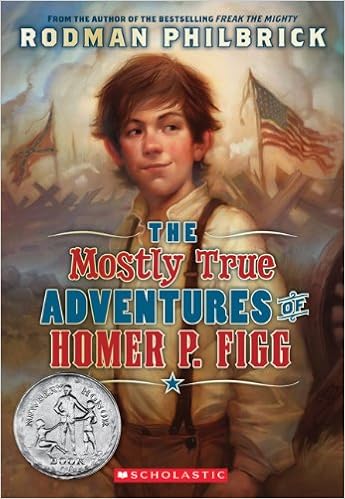Philbrick, Rodman. The Mostly True Adeventures of Homer P. Figg. The Blue Sky Press, 2009.
Lexile Level: 950L
I
loved quite a bit about this book. Homer's attitude and perspective
were a really effective juxtaposition to the severity of the events
that he was encountering, like the events surrounding Jebediah
Brewster and the Underground Railroad or Professor Fleabottom and his
many attempts to con people out of their money. I was a little
disappointed that, as the book went on, it felt as though the tone
and pace of the book hastened, as if it was rushing a bit to get to
the set piece at the end. The final battle at Gettysburg is quite
jarring, with its much more gruesome descriptions like "Even
when they're dead, bullets make them flinch". I was surprised
by how the book pivoted and became a visceral depiction of the
horrors of battle, especially when viewed through the eyes of a
child. Overall, I enjoyed the book quite a bit, I just feel that the
path to the final Gettysburg battle could have been a bit more
developed.
The
Mostly True Adventures of Homer P. Figg did generate some strong
emotions over the course of its duration. For the most part,
happiness was brought on by laughter and amusement with the antics of
Homer himself, with his perspective and commentary often serving as a
humorous counter that undercut the dire situations in which he often
found himself. I was also quite upset whenever Harold's unjust
treatment was mentioned, as well as during any instances of their
uncle's mistreatment of them. During the Gettysburg battle, I
was taken aback by the language used to describe the battle, as it
was a little bit more graphic and visceral than I was anticipating.
That's not to say that it was excessive, just that it took me by
surprise and left me feeling somewhat distressed. This is the only
section of the book that would leaving me considering deselection, as
it may be slightly inappropriate for the younger side of the book's
recommended age group, which seems to dip as low as 8 or 9, depending
on the source. I don't think that this is enough to disqualify
the book entirely by any means, just that some caution should be used
when a younger reader is approaching it.

No comments:
Post a Comment